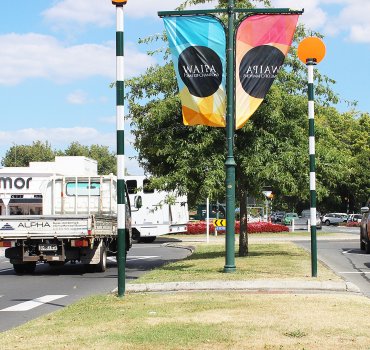

The Cambridge CBD will be a 40km/h zone under the new plan.
Cambridge’s town centre will become a 40km/h zone for drivers under far-reaching proposals the Waipā District Council called for submissions on recently.
The council has come up with a whopping 200-plus speed changes in the wake of a public consultation series as part of its Safer Roads, Safer Waipā programme, part of a national roading initiative. It says 84 of the proposals are “significant”.
The plan to cut the limit from 50 to 40km/h in Cambridge – where an average 16,000 vehicles are driven through the CBD every day – is mirrored in Te Awamutu. The changes in Te Awamutu would not impact on limits on SH3.
The council says the review is justified because population numbers are rising, the roads are catering for a wide range of users including cars, pedestrians, cyclists and heavy vehicles – and because a pedestrian hit by a car at 40km/h has a 70 percent chance of surviving, compared to 15 percent at 50km/h.
It is expected Waipā district’s population will rise by a further 25,000 by 2050. The council’s speed limit bylaw proposal says almost 340 submissions were received in response to calls for comments and public drop-in sessions late last year. Of those, almost 200 complained that current speed limits made their roads unsafe.
The submissions prompted a raft of proposed speed reductions on rural roads. A sample of comments presented by the council including this one: “Our rural roads can be outright scary with speeding motorists on the one hand, and local traffic turning in and out of driveways, as well as many cyclists, tractors, etc., on the other.”
The council’s Road Corridor Manager Bryan Hudson said he was confident about the rigour of the submissions.
“We were hearing about skids marks, broken fences and crashes – and that drivers appeared to feel obliged to overtake because the speed limit was 100km/h,” he said. The data presented in the report showed Waipā had an average 240 significant road crashes a year – they claimed an average of two lives a year and left 18 people with serious injuries.
Bryan Hudson said while the average number of road deaths in Waipā may appear low, on a five year review it still added up to 10 deaths and 90 people with injuries which could impact on them for the rest of their lives. He said New Zealand had enjoyed a downward trend in fatal road crashes, but a review of the five-year periods showed numbers were rising again.
In Europe where similar slower speed plans were being introduced, the fatality rates were a third of those in New Zealand.
In Cambridge the proposal is to reduce speed limits in a significant number of residential and commercial streets from 50kmph to 40kmph, and reduce limits in “high-speed” stretches of road where limits are now 70 or 100km/h.
The limit on Hydro Rd, from Ariki St to 50m east of Maungatautari Rd, would plummet from 100 to 20km/h and Hanlin Rd, outside St Peter’s School, would become a 30km/h zone – also down from 100. The plan also calls for reducing speed limits on roads with schools on them.
Bryan Hudson said changes were necessary to cut down speed-related death and serious injury.
“Whether you’re in a car, on a bike, walking or riding a horse, we want everyone to feel safe on our roads.”
The proposals are in line with a national speed management guide which considers a number of factors when setting a speed limit, including traffic volumes, development road characteristics and crash risk.
Bryan Hudson said the plan was “only the first step”.
“We’re also planning improvements on a number of roads, including more pedestrian crossings, widening roads, adding cycle lanes and improving intersections.”
The proposed changes are supported by key road safety partners including police, the NZ Transport Agency and the Automobile Association.
It’s anticipated that following the consultation period, the council could make final decisions on the new speeds by the end of April.
You can find more details here or at council offices.








